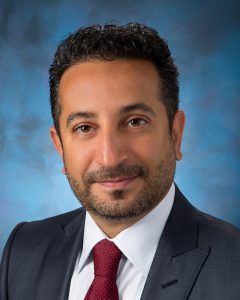The Role of Acupuncture in the Treatment of Pain and the Opioid Crisis
 Iman Majd, MD and director of the Osher Clinic for Integrative Medicine at the University of Washington is a Diplomate of the American Board of Integrative Medicine® (ABOIM®), a licensed acupuncturist, and a family medicine physician pioneering the delivery of integrative medical services featuring acupuncture. He believes acupuncture can be a part of an effective treatment plan without opiates.
Iman Majd, MD and director of the Osher Clinic for Integrative Medicine at the University of Washington is a Diplomate of the American Board of Integrative Medicine® (ABOIM®), a licensed acupuncturist, and a family medicine physician pioneering the delivery of integrative medical services featuring acupuncture. He believes acupuncture can be a part of an effective treatment plan without opiates.
Many years ago, Dr. Majd was suffering from severe back pain that was not responding to typical treatments. An MRI supported surgery but he instead opted for a less intrusive approach upon consulting with a professor at Bastyr University of Natural Medicine. After a few acupuncture sessions, his pain decreased significantly enough to rehab to full recovery. “Acupuncture made a huge difference in my pain management and the quality of my life,” Dr. Majd said. “That was the turning point for me.” Convinced of the efficacy of acupuncture in treating pain, Dr. Majd returned to school to earn his master of science in acupuncture, and since 2005, he has adopted this form of traditional Chinese medicine as part of his practice.
Prior to that, Dr. Majd says, he treated patients suffering from pain as a Western-trained doctor would, by following guidelines that included physical therapy and medication, and sometimes narcotics. Knowing, however, that every effective treatment has side-effects, he was constantly in search of an alternative. Before using acupuncture in his practice, his alternative treatment was exercise and physical therapy. Now, to help patients suffering from acute, sub-acute, or chronic pain, his first option is acupuncture, massage, and, if needed, anti-inflammatory medication. Dr. Majd says that, as much as possible, he tries to avoid prescribing narcotics. “There is a place for them,” he says, “but they are a last resort.”
To understand how acupuncture works to manage pain, it helps to know how the brain responds to it. Acute pain, if not managed properly, becomes chronic, Dr. Majd says. As it moves from acute to chronic, pain creates changes in the brain. Some studies of patients with chronic pain have shown that the part of the brain responsible for emotions and perceptions – the prefrontal cortex – has changed. Because the prefrontal cortex no longer functions properly in managing pain, people with chronic pain suffer intense pain that impairs their sleep, mood, and memory, as well as their ability to function in society.
Several studies support the use of acupuncture as pain treatment. A 2015 study by Massachusetts General Hospital and Harvard University showed that repeated acupuncture can reduce or eliminate the need for opioids by restoring the balance and connectivity of key pain regions in the brain, thus altering pain-related attention and memory. Other studies show that repeated acupuncture, meaning 8 to 12 sessions, causes parts of the brain, including the prefrontal cortex, to become more active. The brain sends more messages to its other areas to better modulate the perception of pain. This leads to a reduction in pain intensity, less need for prescribed medication, and an improved quality of life. Any treatment that can stimulate positive changes in the brain without introducing chemicals is the best option, Dr. Majd says.
Repeated acupuncture also increases immune system activity, he points out. Studies reveal that when the immune system gets stronger, brain function improves. Dr. Majd is heartened that some hospital emergency rooms have seen positive results in using acupuncture to treat pain, which means that repeated treatments may not always be necessary. What’s more, when compared with the use of opiates, acupuncture, poses far fewer risks. Its side-effects may include bruising and minor discomfort in the areas of needle insertion, while the side effects of opiates often include constipation, sleep disturbance, and dependency.
Considering the benefits of acupuncture, Dr. Majd says he would like to see all conventional medical systems adopt acupuncture as their first line of pain treatment, and incorporate it in both in-patient and out-patient services.
The ABOIM is a Member Board of the American Board of Physician Specialties® (ABPS), which fully supports the efforts of dedicated integrative medicine practitioners like Dr. Majd who combine mainstream medical therapies with alternative therapeutic approaches to improve their patients’ quality of life. For more information about the ABOIM, contact the ABPS today.






